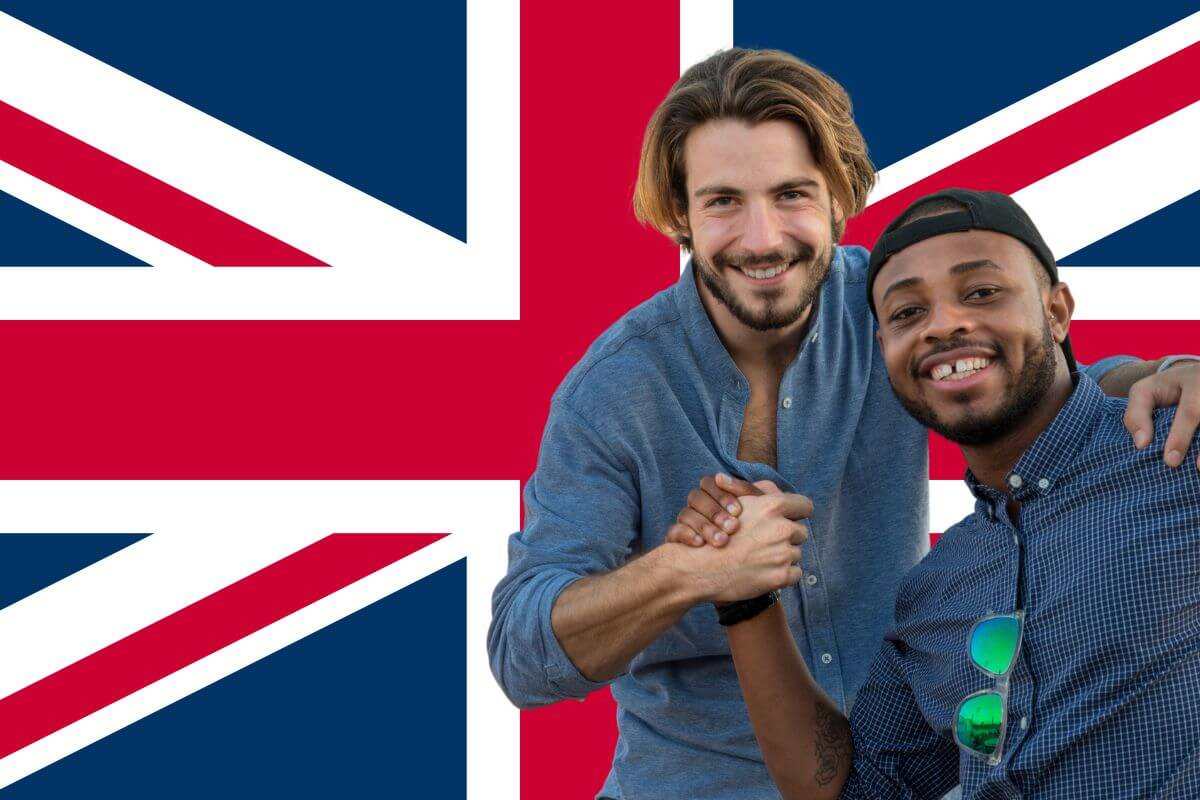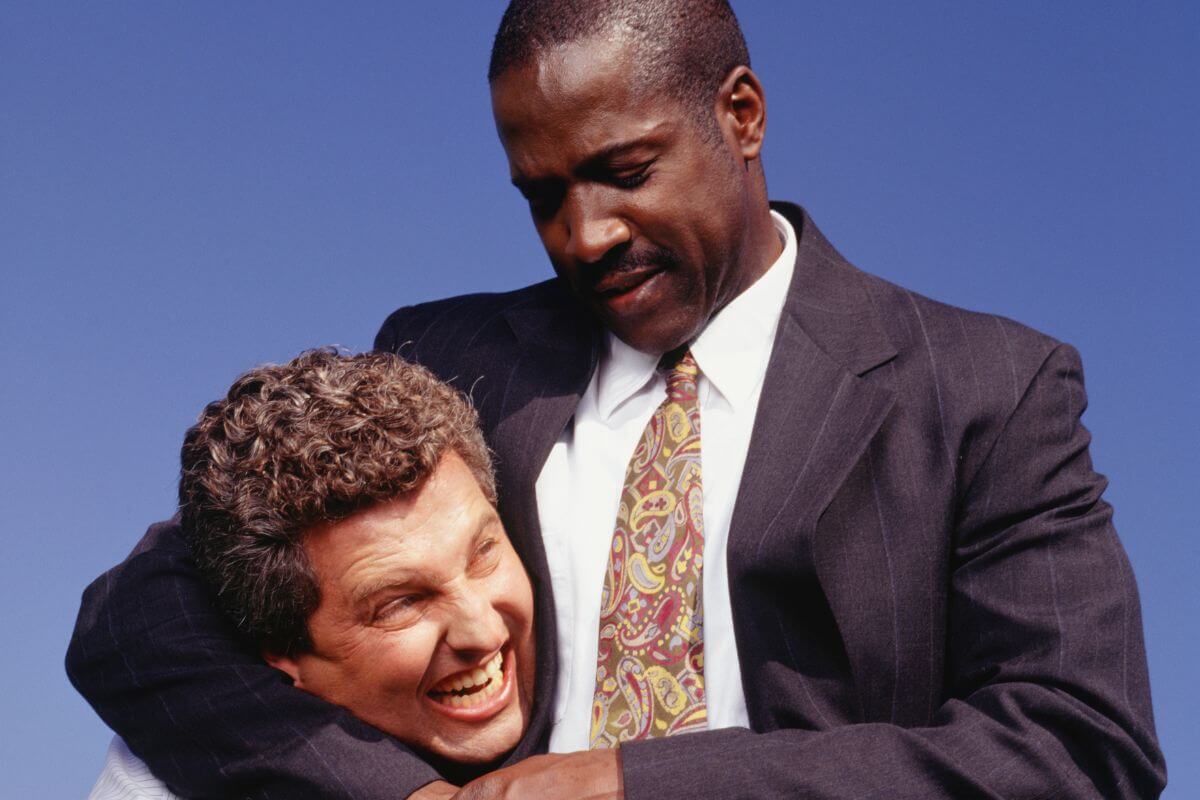By far the most common British slang word for friend is “mate”. This is used by just about everyone in all parts of Britain. It’s so common that it is really the only primary slang term for friend used anywhere in Britain—though you do have other regional terms like “mucker”.
The British of course make use of most of the broader slang terms for friends that are largely shared by most English-speaking nations.
These include terms like “buddy” and “pal”, among others.
But, by and large, everyone in Britain calls their friends their mates.
Let’s find out more.

What do the British call their friends?
Mostly, the British tend to refer to their friends as their mates.
Mate

This term mate is virtually totally ubiquitous across Britain, used in the furthest northern reaches of Scotland to the lowest reaches of the south coast of England.
Everyone understands the word mate, and while not absolutely everyone will use it, they will certainly understand it.
It’s considered a very informal term and can be used to address someone you don’t know as well as to describe your friend.
Its informality is really the only reason it isn’t used by everyone.
Some people prefer not to speak in such colloquialisms like this, even among their most familiar friends and loved ones.
That’s just part of who they are!
So, the term mate does have a fairly wide application.
You could use it, as I said, to describe a very close friend.
You might say your “best mate” to describe your closest friends.
You might talk about your wider circle of friends as your “mates”, indicating they are friends in the truest sense of being people you know well and hang out with.
On the other hand, as I said, the term can just be a friendly way to address people even if you don’t actually know them.
There are obviously many such parallels in other languages, used in all kinds of daily interactions such as with shopkeepers or just people in the street.
Mucker

Other than that, you do have the term “mucker,” often used in the phrase “me old mucker.”
In this context, “me” here has the value of “my,” just for clarification.
This term, however, is a great deal more archaic and regional, and is not used anywhere near as widely as “mate” is.
It might be heard in certain parts of England, particularly in older, working-class communities, but it’s largely fallen out of common usage in modern British English.
Pal

Another British way of saying friend is “pal.”
This term is slightly less informal than “mate” but still conveys a sense of closeness and camaraderie.
“Pal” is often used when you want to refer to a friend in a friendly, informal manner.
Buddy

British people may otherwise call their friends “buddy.”
While “buddy” is more commonly associated with American English, it has found its way into British English as well.
Especially in casual conversations or when influenced by American media.
It’s a friendly term to address a friend and is often used in a relaxed, amicable context.
Chum

Another way of calling your friend is “chum.”
“Chum” is a somewhat old-fashioned term for a friend or companion, but it can still be heard in British English, especially in more formal or literary contexts.
It’s not as commonly used in everyday speech as “mate” or “pal,” but it adds a touch of charm and nostalgia when employed.
Why do the British say mate?
So, where does this all-encompassing term “mate” come from?
As you might expect, it has a long and complex history.
The oldest form of the word related to chess, and came from the Old French mater which meant to overcome or defeat—thus “checkmate”.
This was as early as the year 1300.
Later on, though, in the middle of the 14th Century, it came to take on the meaning of an associate or comrade, particularly a brother-in-arms at war.
By the late 14th Century it had taken on the meaning simply of a habitual friend, someone you very often see.
By sailors and laborers and other workers, it was used as a form of address since at least the middle of the 15th Century.
So, these two meanings are essentially combined in the present day in that mate is both a form of address and your habitual companion.
Why do the British say mucker?
Where, then, do we get the more regional slang “mucker”?
For this one, the origin is a bit less clear.
There are a few theories about where it comes from.
There are a variety of potential root words.
The most widely accepted theory is that it came from the figurative sense of “to muck about”, meaning to mess around, as you would with a friend.
That word muck was in turn derived from Old Norse, where moka meant someone who removes manure from stables.
And thus it eventually came to mean someone who makes a mess. SO, the idea is that it’s about making a mess—often as children do with their friends.
But we are not completely sure where this one comes from.
Do the British say chum?
The British do indeed say chum, although certainly not with the regularity that film and television might have you believe.
Even in Britain, quaint as its slang can seem to the rest of the English-speaking world, “chum” is considered an archaism, the kind of thing that someone doing an impression of a British person would use—and not an actual British person.
That said, among certain classes of the older generation, chum is definitely still in use to some degree.
You’ll often hear members of the royal family using this term, so if nothing else, aristocrats and ordinary people alike like to use this term if only to emulate the royal family.
The royal family, though, are nothing if not remnants of a bygone time—so this only goes to show even further that chum is not a common slang term today.
So, while there is a reasonably wide selection of ways to address people as your friends in British slang, generally, the term that everyone uses is mate.
This is a catch-all term that works both with your closest friends and with people you don’t necessarily know all that well.
What’s more, everyone will understand what you mean by mate and will understand the different levels at which the term can work.
More in British Slang
- British Slang For Alcohol
- British Slang For Angry
- British Slang For Argument
- British Slang For Bad
- British Slang For Boss
- British Slang For Boy
- British Slang For Breasts
- British Slang For Butt
- British Slang For Car
- British Slang For Cat
- British Slang For Child
- British Slang For Cigarette
- British Slang For Coffee
- British Slang For Cold
- British Slang For Cool
- British Slang For Delicious
- British Slang For Diarrhea
- British Slang For Dog
- British Slang For Drunk
- British Slang For Easy
- British Slang For Expensive
- British Slang For Eyes
- British Slang For Face
- British Slang For Fat Person
- British Slang For Fist Fight
- British Slang For Flatulence
- British Slang For Food
- British Slang For Friend
- British Slang For Girl
- British Slang For Glasses
- British Slang For Going To Bed
- British Slang For Good
- British Slang For Good Luck
- British Slang For Goodbye
- British Slang For Gossip
- British Slang For Grandmother
- British Slang For Gun
- British Slang For Hair
- British Slang For Happy
- British Slang For Head
- British Slang For Helicopter
- British Slang For Hello
- British Slang For Horny
- British Slang For House
- British Slang For Hungry
- British Slang For Hurry Up
- British Slang For Husband
- British Slang For Idiot
- British Slang For Jail
- British Slang For Jerk
- British Slang For Job
- British Slang For Kiss
- British Slang For Knife
- British Slang For Loser
- British Slang For Lover
- British Slang For Lying
- British Slang For Menstruation
- British Slang For Money
- British Slang For Motorcycle
- British Slang For Mouth
- British Slang For No
- British Slang For Nonsense
- British Slang For Nose
- British Slang For Pajamas
- British Slang For Party
- British Slang For Police
- British Slang For Poor
- British Slang For Potato
- British Slang For Pregnant
- British Slang For Rain
- British Slang For Relax
- British Slang For Rich
- British Slang For Sailor
- British Slang For Sandwich
- British Slang For Scared
- British Slang For Sexy
- British Slang For Shoes
- British Slang For Silly
- British Slang For Soldier
- British Slang For Stomach
- British Slang For Surprised
- British Slang For Tea
- British Slang For Teeth
- British Slang For Telephone
- British Slang For Television
- British Slang For Testicles
- British Slang For Thank You
- British Slang For Thief
- British Slang For Tired
- British Slang For Toilet
- British Slang For Umbrella
- British Slang For Vacation
- British Slang For Vomit
- British Slang For Walking
- British Slang For Weird
- British Slang For Wife
- British Slang For Wonderful
- British Slang For Work
- British Slang For Yes
- British Slang Insults
- British Slang Quiz


Interesting minefield.
A few observations.
“Pal” can turn very quickly from an affectionate term to a hostile one in nano-seconds. “I’m going out to the Kings Head tonight with a few pals” is a benign and affectionate use of the term; “Who are you looking at, pal?” is a combat indicator that the utterer is not regarding you with cheery intent and it would be a wise moment to drink up and depart.
“Mucker” or “Mucka” is almost universally used in a benign and positive intent. Its popular amongst military and ex- as a salutation to a much loved (not in a Wendy Walk sense) and respected friend. Also “Bezza”, as in a slurred, 0200, arm draped over their shoulder; “Chalky now, now Chalky, he’s a great mucka. He’s the bloke that broke that blokes jaw, oo was trying to strangle me at that fight down at Joanna’s. He’s my bezza”